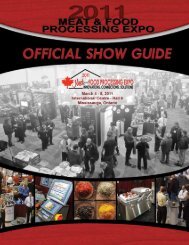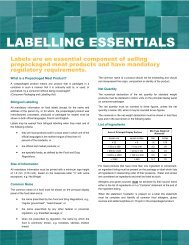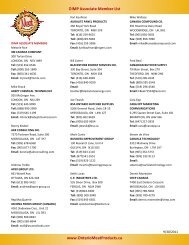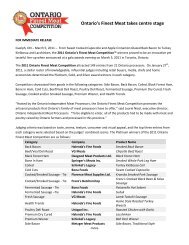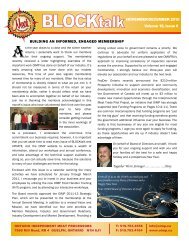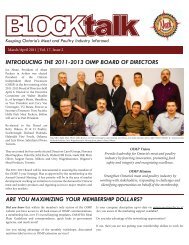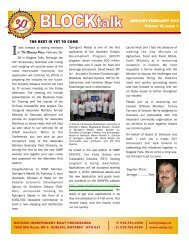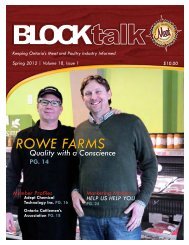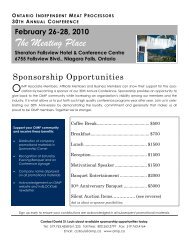record breaking numbers - Ontario Independent Meat Processors
record breaking numbers - Ontario Independent Meat Processors
record breaking numbers - Ontario Independent Meat Processors
You also want an ePaper? Increase the reach of your titles
YUMPU automatically turns print PDFs into web optimized ePapers that Google loves.
[ Government Relations]<br />
RECORD KEEPING AND FOOD SAFETY<br />
In the meat business, it’s about producing safe food, day in and day out<br />
By: <strong>Ontario</strong> Ministry of Agriculture, Food and Rural Affairs (OMAFRA)<br />
<strong>Ontario</strong> has one of the highest food safety<br />
standards in all of Canada and meat<br />
plants play a vital role in maintaining<br />
our reputation of safe, high-quality meat<br />
products. Record keeping is an important<br />
part of <strong>Ontario</strong>’s approach to food safety.<br />
Records allow meat plants to spot trends<br />
and areas of possible improvement. In<br />
addition, if something were to go wrong,<br />
<strong>record</strong>s can help figure out what happened.<br />
The following are two examples that<br />
further illustrate the importance of proper<br />
documentation and <strong>record</strong>-keeping:<br />
• Records that are part of the preventative<br />
maintenance program contribute to<br />
food safety by helping identify gaps that<br />
could lead to product contamination.<br />
• Pre-operational <strong>record</strong>s help identify<br />
issues that may have cropped up<br />
between shifts, for example.<br />
• Record keeping requirements vary<br />
greatly depending on the processes<br />
performed in your plant and the types<br />
of products you process. OMAFRA is<br />
committed to providing flexibility in<br />
<strong>record</strong>-keeping, while maintaining the<br />
food safety standards contained in the<br />
meat regulation.<br />
Records can be designed in many different<br />
ways and can be adapted to suit your<br />
needs. As examples, OMAFRA has sample<br />
templates which can be used to <strong>record</strong><br />
sanitation, pre-operational inspection,<br />
maintenance and pest control activities<br />
as well as temperatures (contact the<br />
Agriculture Information Contact Centre<br />
for copies at 1-877-424-1300 or ag.info.<br />
omafra@ontario.ca). The OIMP also has<br />
sample <strong>record</strong>s for most requirements<br />
under the meat regulation.<br />
Brief Glossary of Terms:<br />
Written programs are documents that you<br />
need to prepare once and to keep on file.<br />
They contain procedures, schedules and<br />
18 BLOCKtalk January/February 2011<br />
methods for maintaining the plant. You<br />
will need written programs for pest control,<br />
maintenance and sanitation, and recall. The<br />
documents need to be updated if you make<br />
any changes to your programs.<br />
Policies describe how the operator will<br />
establish and maintain programs in the<br />
plant. They are generally prepared once and<br />
kept on file, unless changes are required.<br />
Examples include visitor policy, health and<br />
safety policy, good manufacturing practices<br />
policies, etc.<br />
Protocols are required for some highrisk<br />
activities that have the potential to<br />
contaminate other meat products in the<br />
plant (e.g. hunted game, specified risk<br />
material, pet food). Depending on the<br />
protocol, OMAFRA approvals may be<br />
required.<br />
Records are documents you need to fill out<br />
on an ongoing basis, or as programs in<br />
the plant are updated. They may include:<br />
production <strong>record</strong>s (e.g. cooking, smoking,<br />
drying, fermenting, canning); product<br />
assessment (e.g. pH, water activity, product<br />
temperature); calibration of measurement<br />
equipment; processing of pet food; receiving<br />
incoming materials (meat and non-meat<br />
products); distribution <strong>record</strong>s; product<br />
returns; sanitation activities; maintenance<br />
of equipment; pest control activities; etc.<br />
Records such as recipes would need to be<br />
updated only when changed.<br />
For More Information, Contact:<br />
Agriculture Information<br />
Contact Centre<br />
1-877-424-1300 or<br />
ag.info.omafra@ontario.ca<br />
Frank Rizzardo, Operator of Salumeria Tagliere—<br />
Record keeping is an important part of <strong>Ontario</strong>’s<br />
approach to food safety. Photos by Alan Yee, OMAFRA<br />
www.oimp.ca



